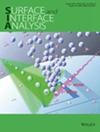表面分析洞察笔记。X射线光电子能谱图像的主成分分析。预处理的重要性
IF 1.8
4区 化学
Q4 CHEMISTRY, PHYSICAL
引用次数: 3
摘要
本Insight Note是继之前两份关于X射线光电子能谱(XPS)图像分析的Insight Note之后发布的,这两份Insight Note涉及分析原始数据和使用汇总统计数据的重要性。作为XPS图像探索性数据分析(EDA)的下一步,我们现在展示XPS图像的主成分分析(PCA)。当数据集中的频谱在某种程度上相关并且频谱中的噪声不重要时,PCA是合适的。在这些情况下,主成分分析可以显著降低数据集的维数和复杂性。预处理是许多PCA的重要组成部分。它的有用性通过一个小的模拟数据集来说明,其中显示了不进行预处理的潜在陷阱。对未经预处理和平均居中预处理的XPS图像数据的PCA进行了说明。显示了用于确定描述数据集的抽象因素(主要成分,PC)数量的尖叫图。我们的XPS图像中的光谱非常嘈杂,这与PCA中前两个PC捕获的中等但仍然显著的方差量一致。使用这两种预处理方法,PC1和PC2上的负载都非常平滑。接下来的六个PC上的负载似乎也包含一些化学信息。使用无预处理和平均居中预处理生成的分数图像揭示了数据集中的许多相同的一般特征,这些特征在我们之前的两份Insight Notes中发现。本文章由计算机程序翻译,如有差异,请以英文原文为准。
Surface analysis insight note. Principal component analysis (PCA) of an X‐ray photoelectron spectroscopy image. The importance of preprocessing
This Insight Note follows two previous Insight Notes on X‐ray photoelectron spectroscopy (XPS) image analysis that dealt with the importance of analyzing the raw data and the use of summary statistics. As a next step in the exploratory data analysis (EDA) of XPS images, we now show principal component analysis (PCA) of an XPS image. PCA is appropriate when the spectra in a data set are correlated to some degree and the noise in the spectra is unimportant. In these cases, PCA can significantly reduce the dimensionality and complexity of data sets. Preprocessing is an important part of many PCAs. Its usefulness is illustrated with a small, mock data set, where the potential pitfalls of not preprocessing are shown. PCAs of XPS image data that were not preprocessed and preprocessed by mean centering are illustrated. Scree plots, which are used to determine the number of abstract factors (principal components, PCs) that describe a data set, are shown. The spectra in our XPS image are quite noisy, which is consistent with the moderate, but still significant, amount of variance that is captured by the first two PCs in our PCA. With both preprocessing methods, the loadings on PC1 and PC2 are remarkably smooth. The loadings on the next six PCs also appear to contain some chemical information. Scores images generated using both no preprocessing and preprocessing by mean centering reveal many of the same general features in the data set that were found in our two previous Insight Notes.
求助全文
通过发布文献求助,成功后即可免费获取论文全文。
去求助
来源期刊

Surface and Interface Analysis
化学-物理化学
CiteScore
3.30
自引率
5.90%
发文量
130
审稿时长
4.4 months
期刊介绍:
Surface and Interface Analysis is devoted to the publication of papers dealing with the development and application of techniques for the characterization of surfaces, interfaces and thin films. Papers dealing with standardization and quantification are particularly welcome, and also those which deal with the application of these techniques to industrial problems. Papers dealing with the purely theoretical aspects of the technique will also be considered. Review articles will be published; prior consultation with one of the Editors is advised in these cases. Papers must clearly be of scientific value in the field and will be submitted to two independent referees. Contributions must be in English and must not have been published elsewhere, and authors must agree not to communicate the same material for publication to any other journal. Authors are invited to submit their papers for publication to John Watts (UK only), Jose Sanz (Rest of Europe), John T. Grant (all non-European countries, except Japan) or R. Shimizu (Japan only).
 求助内容:
求助内容: 应助结果提醒方式:
应助结果提醒方式:


